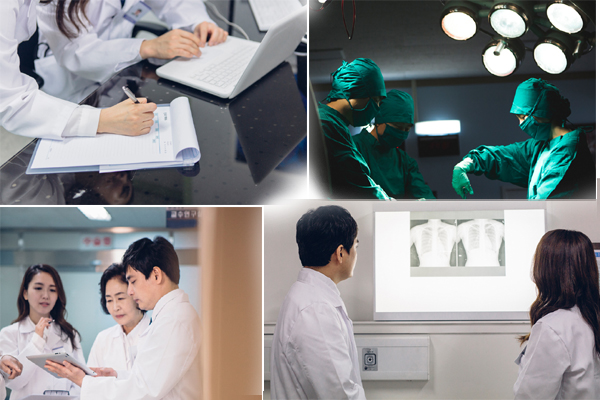Training hospitals are increasingly changing the way they train interns, giving them “doctors’ work” more.
Some are reducing chores and letting interns participate in simple operations with others revising their training system to help interns learn key clinical subjects such as internal medicine and pediatrics.
Recently, Seoul National University Hospital held a meeting of “Education Training Committee,” consisting of professors at major departments, to discuss how to change the internship training to assign them more relevant duties.
SNUH decided to let the training committee set up basic guidelines for training and apply them to each department by the department’s situation.

After the decision, interns at SNUH are allowed to attend a simple operation. They do not have to prepare a cart (a preparation bed for surgery) at the end of operation if they have to see patients. At some departments, interns can become attending doctors in simple cases.
“In the past, interns’ jobs were mostly carrying patients in and out of the operation room and doing work irrelevant to doctors’ jobs. They used to do IVs (intravenous injections) and sampling blood, too,” said a professor at SNUH, wishing to be unnamed.
“But as doctors’ competency is getting more important now, we reduced chores for interns, brought a skilled IV team, and hired additional workforce for carrying carts, so that interns can work as a doctor. This has reduced the workload of interns, but hospitals are changing to help patients who could have suffered painfully due to poor-skilled interns’ IV treatment.”
According to the professor, SNUH’s job management committee is supporting the budget to operate an IV team, which took over the job of IV treatment from interns.
“The biggest change is that we have a different work culture at the hospital. Gone are the days when we used to say, ‘Call interns,’ all the time. Our hospital shared good examples of other hospitals and made the change,” the professor added.
Interns and residents are also taking initiatives to cut down irrelevant work.
SNUH’s association of interns and residents set a goal of reducing interns’ chores and does not put interns in unnecessary work such as preparing snacks.
“We received complaints that interns’ most of work was chores that are irrelevant to doctors’ work. For example, interns were doing unfair duties such as dinner delivery and preparation of conference snacks,” said Jeon In-pyo, head of the association. “We sent a letter to the education and training team to make sure interns do not handle such work. We also asked interns to contact the department directly so that they can adjust duties.”
Jeon added that his association exempted interns from organizing the clinical results in excel files. Blood sampling and nasogastric intubation became nurses’ work, which reduced the workload on interns significantly.
The association also plans to scale down other workloads on interns that were supposed to be assigned to other medical staffs, he said.
“A researcher’s work such as making a registry or obtaining consent for genetic testing is still assigned to an intern, so I will try to solve this problem in the future,” Jeon said. “Some doctors receive medication from interns in advance to give the drug to the patient earlier than scheduled. We are also working on improving the computerized system to eliminate such practices. I will try to help interns work like doctors and get the learning opportunity.”
Another university hospital in Seoul is gearing up to overhaul the entire intern training system.
The hospital said it would revise its internship goal “to achieve competency as a primary care physician” and reform the training system to focus on core clinical subjects such as internal medicine, surgery, obstetrics/gynecology, and pediatrics in the long run. Such change may result in no intern placement in a particular department.
“In each department, interns worked like assistants, doing chores. Now, we are reorganizing interns’ duties to keep a principle that interns should work like a doctor, which is the nature of the internship,” an official at the hospital said.
“Interns are placed in each department with a one month term, so they cannot go through all 26 clinical subjects during the internship,” he said. “As they are trainee doctors, we will reform the training system to focus on key clinical subjects and provide them with doctors’ duties.”

